When Michael J. Fox secured his first major acting gig as Alex P. Keaton in the 1982 sitcom "Family Ties," he rode the high of his burgeoning yet successful acting career. It was a memorable moment in his life, a time when he believed that all his hard work had finally paid off. And while Fox's acting career did indeed take off shortly afterwards, it was also taken away from him just as quickly.
In 1991, Fox was officially diagnosed with young-onset Parkinson's disease, an incurable chronic degenerative disorder of the central nervous system. For years, Fox hid his illness to continue acting, both in movies and television shows. But eventually, his declining condition got the best of him, leading him to retire from his profession in 2021.
Fox's heartfelt story — from growing up on a Canadian army base to his debilitating diagnosis and loving relationship with his wife, fellow actor Tracy Pollan — is narrated in an intimate Apple TV+ documentary titled "Still: A Michael J. Fox Movie." In addition to its archival and scripted elements, the documentary features heartfelt conversations between Fox and director Davis Guggenheim.
Here are the six most major revelations from the feature:
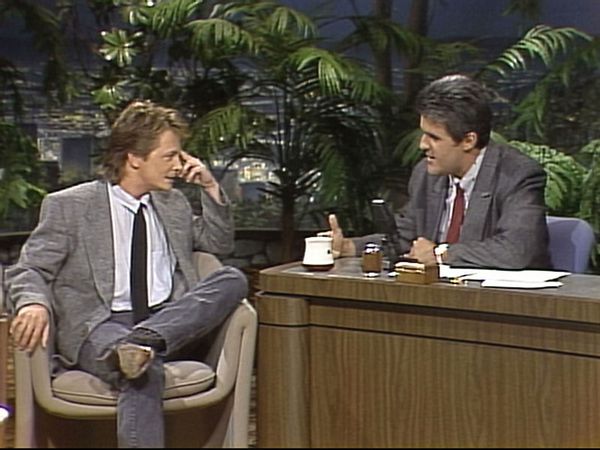 Michael J. Fox in "STILL: A Michael J. Fox Movie" (Photo courtesy of Apple TV+)
Michael J. Fox in "STILL: A Michael J. Fox Movie" (Photo courtesy of Apple TV+)At 18 years of age, Fox moved into a studio apartment in the slums of Beverly Hills to pursue a career in acting. He made his American television debut in the television film "Letters from Frank" and later starred in "Midnight Madness," "Class of 1984" and NBC's "Family Ties."
Although Fox continued to pick up acting gigs, he struggled to earn enough money to get by.
"My agent took 10% of my paycheck," Fox said. "And then there was the photographer, publicist or lawyer. I began to liquidate. I sold off my sectional sofa section by section."
Fox recalled that he almost secured a few acting jobs on films, notably the 1980 coming-of-age movie "Ordinary People." But Robert Redford, the director, wasn't impressed during Fox's audition, so much so that he spent it flossing his teeth.
"I was down to days. I was finding quarters and nickels and dimes, and I'd use that to get to the next moment," Fox said. "I was living beat to beat."
 US actor Michael J. Fox and his wife actress Tracy Pollan attend the world premiere of HBO Documentary Film "Very Ralph" at The Metropolitan Museum of Art on October 23, 2019 in New York City. (ANGELA WEISS/AFP via Getty Images)
US actor Michael J. Fox and his wife actress Tracy Pollan attend the world premiere of HBO Documentary Film "Very Ralph" at The Metropolitan Museum of Art on October 23, 2019 in New York City. (ANGELA WEISS/AFP via Getty Images)The pair met in 1985 on the set of "Family Ties." Although Fox and Pollan played each others' love interests, their relationship off-screen remained strictly platonic until they reunited on the set of the 1988 drama "Bright Lights, Big City." Fox and Pollan began dating and made their red carpet debut on Sept. 20, 1987. A few months later, Fox proposed to Pollan and the couple officially tied the knot on July 16, 1988.
A year after their marriage, Fox penned an essay for Esquire about the frenzy surrounding his nuptials. In it, he wrote, "I got married last summer and the reviews were terrible. Now, bad reviews I can normally handle — you put your work out there and anybody can take their shot. But Tracy and I had never conceived of our wedding as part of our oeuvre."
The couple have four children together: son Sam Michael (born May 30, 1989), twin daughters Aquinnah Kathleen and Schuyler Frances (born February 15, 1995), and daughter Esmé Annabelle (born November 3, 2001).
When asked by Guggenheim how he would describe his wife, Fox said, "Who she is is just so locked in 'cause it's so honest. I could be the king of England, and she would be her. I could be Elvis, and she would be her."
 Michael J. Fox at the Variety Sundance Studio, Presented by Audible on January 21, 2023 in Park City, Utah. (Katie Jones/Variety via Getty Images)
Michael J. Fox at the Variety Sundance Studio, Presented by Audible on January 21, 2023 in Park City, Utah. (Katie Jones/Variety via Getty Images)While shooting the film "Doc Hollywood" in 1991, Fox developed twitching in his pinky finger and a sore shoulder. Shortly afterwards, he was diagnosed with young-onset Parkinson's disease.
"I remember standing on the street, looking for an answer," Fox recalled. "My world blew up."
Fox hid his illness to continue acting in movies, including "For Love or Money," "The American President," and "Frighteners." But eventually, he turned to drugs and alcohol to cope with his diagnosis. In the documentary, Fox recalled that he grew increasingly "sullen and angry."
In 1998, Fox went public about his Parkinson's disease and in the fall of 2000, he launched The Michael J. Fox Foundation for Parkinson's Research. Today, the Foundation remains the world's largest nonprofit funder of Parkinson's drug development, per its official website.
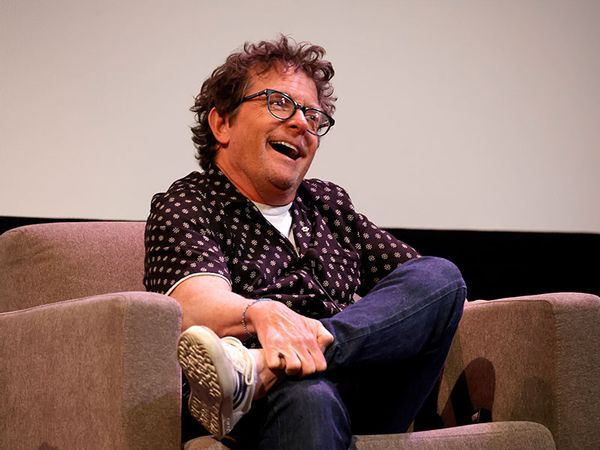 Michael J. Fox speaks at the Q+A for STILL: A Michael J. Fox Movie at the 2023 SXSW Conference and Festivals at The Paramount Theater on March 14, 2023 in Austin, Texas. (Frazer Harrison/Getty Images for SXSW)
Michael J. Fox speaks at the Q+A for STILL: A Michael J. Fox Movie at the 2023 SXSW Conference and Festivals at The Paramount Theater on March 14, 2023 in Austin, Texas. (Frazer Harrison/Getty Images for SXSW)Fox said he would spend most of his time in the bath, day after day for hours at a time.
"I just wanted to keep my head below water," he recounted. "I needed to suffer. I needed to go as low as I could go. All I could hear was the muted splash of my trembling hand. But as low as alcohol brought me, abstinence would bring me lower. I could no longer escape myself."
Fox described his first two years of sobriety as like a "knife fight in a closet." The knife, he added, represented the truth of his reality.
"I just wanted to be out of the world. And I wanted to be in another place, doing another thing."
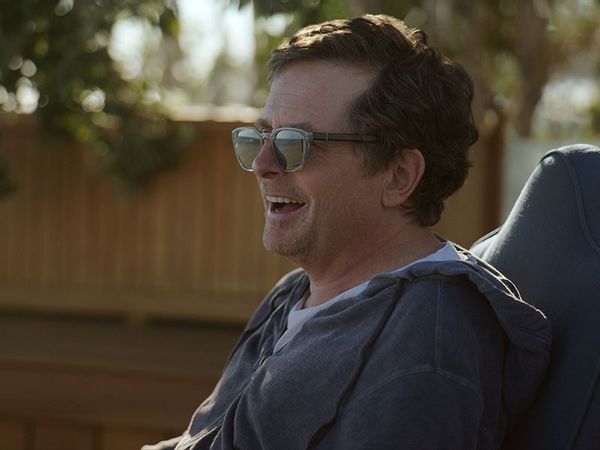 Michael J. Fox in "STILL: A Michael J. Fox Movie" (Photo courtesy of Apple TV+)
Michael J. Fox in "STILL: A Michael J. Fox Movie" (Photo courtesy of Apple TV+)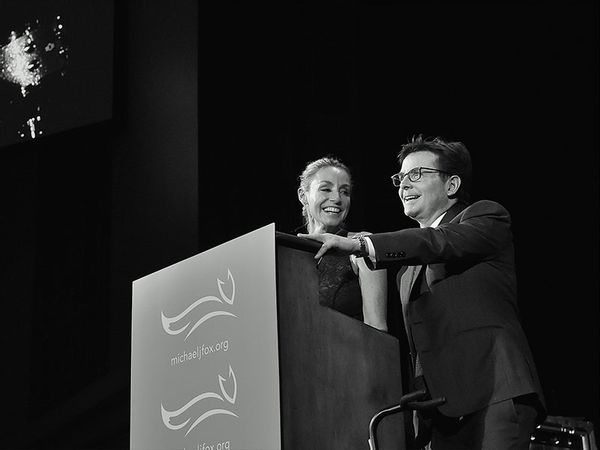 Michael J. Fox and Tracy Pollan in "STILL: A Michael J. Fox Movie" (Photo courtesy of Apple TV+)
Michael J. Fox and Tracy Pollan in "STILL: A Michael J. Fox Movie" (Photo courtesy of Apple TV+)After he disclosed his diagnosis publicly, Fox said he was afraid he would be rejected during auditions, because people would think he couldn't be funny now that he's sick, and misunderstood by many.
But that was far from the case.
"I can look at myself, and I say, 'I have Parkinson's.' So how do I wanna live with that?" Fox asked. "But If I never get past the 'I have Parkinson's' part, if I never get past the part where I wake up in the morning and I go, 'Yeah, that's real. That's happening,' then I can't get past it."
Fox also acknowledged that some people viewed his disease as a kind-of "ending." But for him, it was "really a beginning." Fox poured his heart into the Fox Foundation, which mobilized the Parkinson's community and raised nearly two billion dollars.
"I never actually said this to anybody, but I always fantasized saying it," Fox added. "'Yeah, you're bigger than me. You'll beat me up. But I'll hit you once and you'll hurt.'"
"STILL: A Michael J. Fox Movie" is currently available for streaming on AppleTV+. Watch a trailer for it below, via YouTube:
Read more
about celebrity documentary lists:


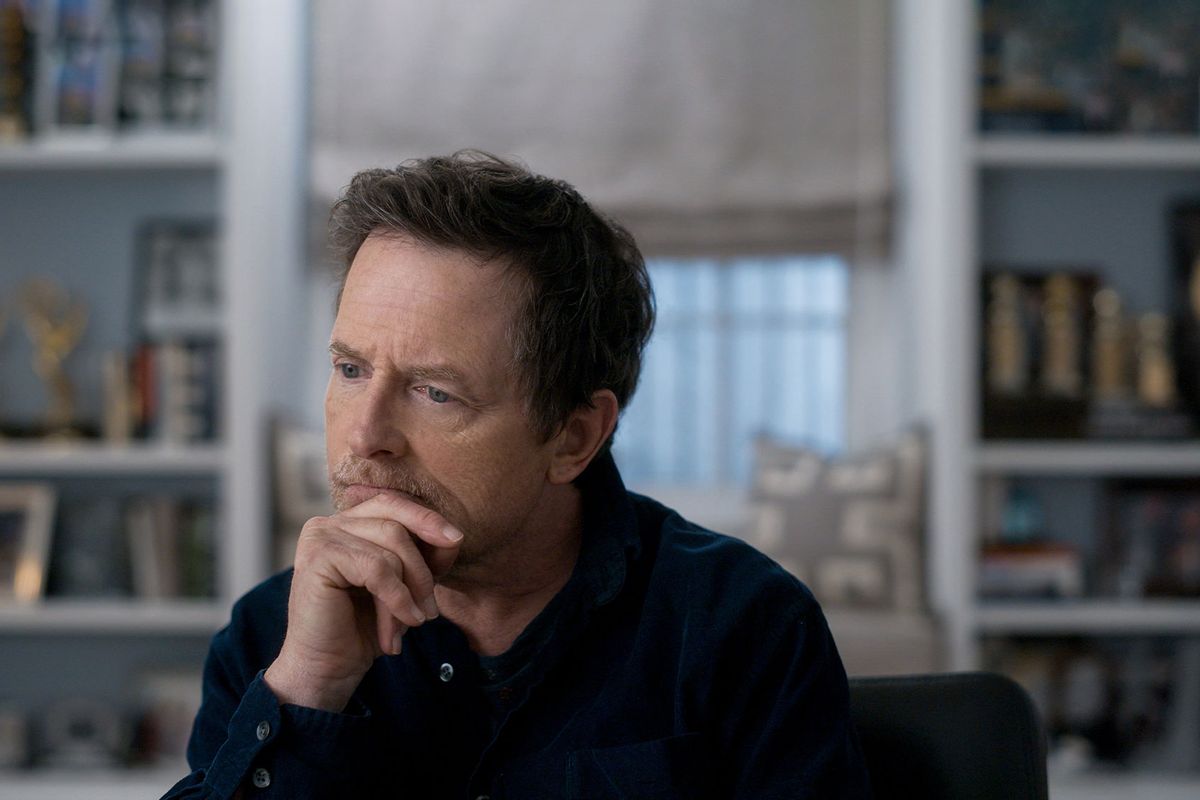
Shares